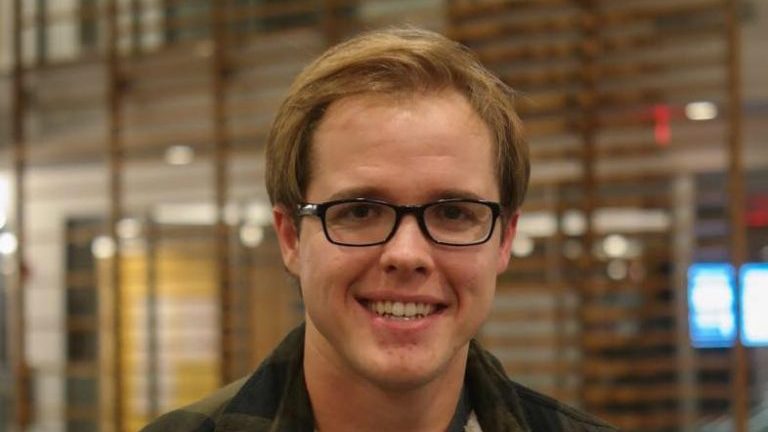Researcher Spotlight – Mike Madden

Spring 2018 Global Change Fellow
Ph.D. Student, Department of Marine, Earth, and Atmospheric Sciences
Advisor: Dr. Walter Robinson

Every year the Southeast Climate Adaptation Science Center funds a multi-disciplinary cohort of Global Change Fellows representing colleges across NC State University. Here are some highlights about Spring 2018 Fellow, James (Mike) Madden, and the applied research he’s conducting.
What do you study?
I study heavy rainfall, floods, climate change, and numerical modeling at the Marine, Earth, and Atmospheric Sciences Department at NC State University. I use high-resolution numerical weather models to understand and make predictions of extreme rainfall, and I use radar, satellite, and surface station data to analyze the performance of those models. I am also interested in the climatology of heavy rain episodes, and how the intensity and frequency of those phenomena could change under the context of a warming climate.
What (or who) influenced you to go into this field of study?
While I have always been mesmerized by heavy rainfall, and storms generally, I wasn’t originally planning on a career in science. Before college, I was considering a variety of career pathways – professional piano performance, theater, pre-law, maybe a professorship in history or political science. Things changed during my senior year in high school, when I became intrigued with the buzz about climate change. People would argue about it on cable news, newspaper columns, and talk radio, and the folks I knew were divided about it. I became curious, and I started reading the literature. After my initial studies, I gained a deeper appreciation for the scientific process, and of climatology and meteorology, and realized that the findings of the scientific community were to be taken seriously. I wanted to address this global problem, and thus I chose to educate myself. Then, I could contribute to our body of knowledge and lead others to an evidence-based understanding.
What is the most important thing that you’ve learned?
Climate change has likely increased the intensity and frequency of heavy rainfall events, and it is possible that some of these trends will continue as the climate warms. This is quite concerning, given that heavy rains trigger floods that place our livelihoods at risk. If heavy rainfall events become more numerous and powerful, then our communities will need to adopt stronger resilience and safety measures.
Who will benefit from your research?
Everyone stands to benefit when we become able to anticipate heavy rains well in advance, and when we use evidence and data to evaluate the risks of extreme weather that could occur many years later. Atmospheric scientists have saved time, money, and lives by extending the lead time from warning to disaster, and by informing communities of the steps they could take to become more resilient.
How can your research be used to inform management decisions?
If we can foresee an increase in the intensity and/or frequency of heavy rainfall events, then we could make wise and responsible decisions that would benefit the health, safety, and vitality of our communities. Infrastructure that can withstand a lengthy, violent downpour could be built to provide safety and assurance. Roads, homes, businesses, and schools could be placed strategically in areas that are not as susceptible to flash flooding. Emergency crews could update their disaster plans. Vehicles could be built with features that allow rescuers to more easily access trapped passengers. Power lines could be better engineered such that they lessen the probability of floodwater electrocution. Drainage mechanisms could be built or redesigned. Wastewater treatment plants could be retrofitted to accommodate higher capacities from storm water run-off. Echoing Dr. Seuss, “Oh, the things we could do that are good for us.” The sky is the limit.
What do you think is the most pressing issue related to global change?
Without exception, the most pressing issue related to global change is how we respond to it. If we are aware of the consequences that arise from either naturally-occurring cycles or our modifications to the environment, and do not take the necessary steps to address them and minimize tragedy, then surely the most pressing issue is us.
How do you expect the SE CSC Global Change Fellows Program to impact you and your work?
Already I have met an incredible and inspiring group of individuals from various backgrounds. I learn from them and have gained much insight into their respective disciplines, and I hope to incorporate that knowledge into my research. Also, I have been given tremendous opportunities to travel to conferences, collaborate with experts, host panel discussions, and present my findings. I look forward to another amazing term and to meeting the new team of Fellows!
How would you describe your research to a 3rd grader?
At NC State University, I study storms that lead to extreme rainfall. How do these storms work? How are they formed? Where does all the moisture come from? Will a warmer climate in the future cause storms to be more severe and numerous? To answer these questions, I have used powerful computers to make models of these storms, and have collected piles of data from radars, satellites in space, and weather stations to study these rains in high detail.
What is your dream job?
I want to be someone like Brian May. He is the lead guitarist of Queen, a photographer, and an astrophysicist. That’s just awesome. Or someone like Russ Schumacher, who studies heavy precipitation at Colorado State University, and was the winner of the 2004 Jeopardy! Tournament of Champions.
Besides being a game show host, a keyboardist for a traveling rock band, or an elected official, I would like to become a professor of atmospheric science or physics. I feel that this pathway would allow me to teach, publish, entertain, and be an active member of the community. Anything that allows me to fulfill those missions would make me happy for life.
- Categories:
